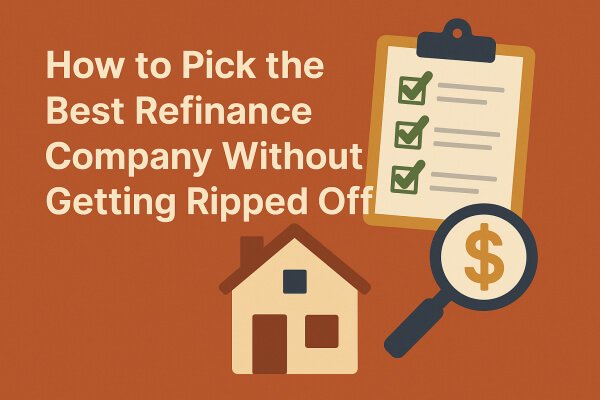Comparing The Best Mortgage Lenders For Refinancing in the UK

Finding the best mortgage lenders for refinancing isn’t always straightforward. There are numerous options available, and not all of them are equal.
Refinancing your mortgage in the UK can be a smart way to cut costs, lock in a better rate, or free up some cash.
Whether you’re chasing a better rate, reducing your monthly payments, or just want more flexible terms, remortgaging can be a smart move, especially in today’s shifting market.
In this guide, I’ll walk you through the top lenders offering great remortgage deals. We will examine the features offered by each lender, identify potential fees, and demonstrate how to compare them effectively, enabling you to make an informed decision without undue stress.
Why Refinance Your Mortgage in the UK?
Refinancing involves more than just pursuing lower interest rates, although that is certainly a significant factor. UK homeowners are refinancing for a bunch of different reasons, and depending on your situation, it might just be the smartest financial move you make this year.
Here are some common motivations:
- Take advantage of lower interest rates
If market rates have dropped since you first locked in your mortgage, refinancing could save you thousands over the life of your loan. - Reduce your monthly payments
By switching to a better rate or extending your loan term, you can ease your monthly budget and free up extra cash. - Switch from a variable to a fixed-rate deal
With interest rates constantly changing, many people are moving to fixed-rate mortgages for more stability and peace of mind. - Tap into home equity
Your property might be worth more now than when you first bought it. Refinancing can help you unlock that equity to fund renovations, consolidate debts, or even invest elsewhere. - Shorten your mortgage term
Want to pay off your mortgage faster? Refinancing to a shorter term could help you become mortgage-free sooner and save on interest in the long run.
What to Look for When Choosing the Best Mortgage Lenders for Refinancing
Selecting the right lender can significantly impact your payments and the ease of the process.
Here’s what to keep in mind when comparing the best mortgage lenders for refinancing:
- Competitive interest rates
A small difference in rates can lead to big savings, so shop around. Look at both the initial rate and the overall cost over the mortgage term. - Fees and hidden charges
Be mindful of the presence of arrangement fees, valuation fees, legal costs, and early repayment charges. Some lenders offer “fee-free” deals, just make sure the rate still stacks up. - Loan flexibility
Can you make overpayments without penalties? Is there a payment holiday option? Flexibility matters if your income or plans might change. - Customer service and support
Go with a lender known for responsive service and clear communication. Trustpilot reviews can give you a quick snapshot of what real customers think. - Digital tools and application ease
Some lenders make the remortgage process fast and painless with online applications and handy mortgage calculators.
The Best Mortgage Lenders for Refinancing in the UK
Here’s where we break it all down. I’ve reviewed a range of lenders based on interest rates, fees, flexibility, and customer experience. If you’re looking to compare the best mortgage lenders for refinancing in the UK this year, start with these five standouts:
a. Nationwide Building Society
Nationwide is a favourite among homeowners, and for good reason. They offer some of the most competitive fixed-rate remortgage deals on the market and regularly run loyalty rewards for existing customers.
Highlights:
- Fee-free options available
- Free standard valuation and legal fees for remortgages
- Flexible overpayment terms
What to watch for:
Some of their best rates are only available to current members, so new customers may miss out on the top deals.
b. Barclays Mortgages
Barclays stands out for their offset mortgage products and strong remortgage incentives. They’re a solid choice if you want flexibility and access to online tools to track your mortgage in real time.
Highlights:
- Offset mortgage options to reduce interest costs
- Easy-to-use digital mortgage calculator and tracker
- Remortgage deals with cashback
What to watch for:
Their best rates often come with higher fees—always check the total cost.
c. HSBC UK
HSBC is a go-to for borrowers who want no-frills, low-rate mortgages. They offer a streamlined online application process and tend to rank well in customer satisfaction.
Highlights:
- Low fixed and tracker rate deals
- Free legals and valuation for many remortgage products
- Trusted, well-established lender
What to watch for:
Their lending criteria can be stricter than other banks, especially for self-employed applicants.
d. Santander
If you’re already a Santander customer, you might get access to exclusive remortgage deals. They’re swift, reliable, and offer a wide range of term lengths and loan types.
Highlights:
- Fast processing times
- Exclusive offers for existing customers
- Fee-free remortgage deals available
What to watch for:
Some deals have early repayment charges that could catch you out later, so read the fine print.
e. Halifax
Halifax is an excellent choice for borrowers seeking stability and long-term fixed-rate options. Their deals often come with cashback or incentives for switching.
Highlights:
- Strong fixed-rate remortgage options
- Cashback offers on selected deals
- Helpful online mortgage management tools
What to watch for:
Interest rates can vary significantly by loan-to-value (LTV), so high-LTV borrowers may find better deals elsewhere.
How to Compare the Best Mortgage Lenders for Refinancing in the UK
The key to getting the right deal is knowing how to compare the best mortgage lenders for refinancing in a way that actually saves you money and hassle in the long run.
Here’s how to do it like a pro:
Use UK-Specific Comparison Tools
Sites like MoneySuperMarket, Compare the Market, and Go Compare are brilliant for getting a quick view of what’s available. You can filter by interest rate, fees, term length, and more, all in one place. Most of them also highlight “fee-free” deals or limited-time offers, which can save you time and cash.
Check the True Cost, Not Just the Interest Rate
That 1.99% fixed rate might look amazing, but if it comes with £1,000+ in fees, you could actually end up paying more than a deal with a slightly higher rate and no fees. Always look at the Annual Percentage Rate of Charge (APRC), which reflects the overall cost over the loan term.
Use a Mortgage Broker
In the UK, mortgage brokers often have access to exclusive remortgage deals that you won’t find online. They’ll also guide you through the paperwork and help you avoid costly mistakes. The best part is that many of them don’t charge you a fee; they’re paid by the lender.
Read Independent Customer Reviews
Before locking anything in, have a brief look at Trustpilot, Google Reviews, or MoneySavingExpert forums. Real feedback from other borrowers can tell you a lot about how a lender treats its customers, how fast they process applications, and how easy they are to deal with.
Look Beyond the Big Banks
Yes, high street names like Halifax and Santander are popular, but don’t ignore building societies or smaller lenders. They sometimes offer better rates and more personalised services, especially for people with unique circumstances.
Know Your Numbers Before You Apply
Make sure you’ve got your:
- Credit score (check for free with Experian, ClearScore, or Credit Karma)
- Current mortgage balance and term
- Estimated property value
- Loan-to-value (LTV) ratio
These details will help you get accurate quotes and avoid surprises later on.
Common Pitfalls to Avoid When Refinancing in The UK
Even if you’ve identified one of the top mortgage lenders for refinancing, a few minor mistakes could result in higher costs than anticipated.
Here’s what to watch out for before you sign anything:
1. Ignoring Early Repayment Charges (ERCs)
Before you switch, double-check your current mortgage terms. Many lenders in the UK charge an ERC if you leave your deal early, sometimes thousands of pounds. Always factor these fees into your total refinancing cost.
2. Getting Hooked on a Low Rate Without Reading the Fine Print
That ultra-low rate might look amazing on the surface, but check the small details. Are there high arrangement fees? Is the rate fixed or just an introductory offer? Always compare the full deal, not just the headline number.
3. Overlooking the Total Cost of the Loan
Focus on the overall cost, not just monthly repayments. A longer term might reduce your monthly payment, but it could mean paying more interest overall. Use a remortgage calculator to see the full picture.
4. Not Shopping Around
Loyalty doesn’t always pay in the mortgage world. Just because your current lender offers you a new deal doesn’t mean it’s the best one out there. Get quotes from at least 3 to 5 lenders or work with a broker.
5. Assuming All Lenders Are the Same
Each lender has different criteria, fees, and service quality. Don’t just go with a big name, compare building societies, challenger banks, and online lenders too.
6. Missing Out on Broker-Only Deals
Some of the best remortgage rates in the UK aren’t available directly to customers—they’re only offered through independent mortgage brokers. Therefore, if you solely rely on lender websites, you may be losing out on potential savings.
7. Rushing the Process
It’s tempting to jump on a deal, especially if rates are rising. But rushing in without reviewing all the costs and terms could leave you locked into a mortgage that doesn’t suit your long-term plans.
Step-by-Step: How to Refinance Your Mortgage in the UK
Refinancing (or remortgaging, as it’s more commonly called in the UK) might seem complicated, but when you break it down, it’s actually pretty straightforward. Here’s how to go about it without the stress:
Step 1: Review Your Current Mortgage Terms
Start by checking:
- Your current mortgage balance
- The remaining term
- Your interest rate
- Any early repayment charges (ERCs)
You’ll need this info before comparing new deals, and it helps you decide if refinancing now is worth it.
Step 2: Get an Up-to-Date Property Valuation
Most lenders will want to know what your home is currently worth. You can get a rough idea using sites like Zoopla or Rightmove, or speak to a local estate agent for something more accurate. Your loan-to-value (LTV) will depend on this figure—and it affects the rates you qualify for.
Step 3: Check Your Credit Score
Lenders will look at your credit history when reviewing your application. You can check yours for free using:
- Experian
- ClearScore
- Credit Karma
The better your score, the more likely you are to get access to top-tier refinancing deals.
Step 4: Compare the Best Mortgage Lenders for Refinancing
Now’s the time to shop around. Use comparison websites, or work with a mortgage broker who can help you access exclusive deals and talk you through the fine print.
Look for:
- Low interest rates
- Reasonable fees
- Flexible terms
- Good customer support
Step 5: Get a Mortgage Agreement in Principle (AIP)
Once you’ve shortlisted a deal, most lenders will offer you an AIP. This is a quick check to confirm you’re eligible—without a full credit check. It shows you’re serious and helps speed things up later.
Step 6: Submit Your Full Application
If you’re happy with the lender and terms, it’s time to go all in. You’ll need to provide:
- Proof of income (payslips or tax returns)
- Bank statements
- ID and address documents
- Details of your current mortgage
Your new lender will also carry out a valuation of your property—usually online or via a drive-by assessment.
Step 7: Let the Legal Work Happen (Most of It’s Done for You)
Good news: most UK lenders include free standard legal work as part of a remortgage package. The solicitor will handle everything from redeeming your old mortgage to switching the title with the Land Registry.
Step 8: Completion Day—Your New Mortgage Kicks In
Once everything’s signed off, your new mortgage replaces the old one. The lender settles the balance with your current provider, and your new monthly payments begin.
Conclusion
Refinancing your mortgage isn’t just about chasing lower interest rates, it’s about making your money work harder for you. Whether you’re looking to save on monthly payments, pay off your loan faster, or release some equity, taking the time to compare the best mortgage lenders for refinancing in the UK can really pay off.
Knowing what to look for, you’ll avoid the common traps and find a deal that actually suits your goals. And remember, the best deal for someone else might not be the best one for you. Always compare a few lenders, and if you’re unsure, speak to a mortgage broker who can guide you through the process.
FREQUENTLY ASKED QUESTIONS
Can I refinance my mortgage with bad credit in the UK?
Yes, you can, but your options will be more limited. Some specialist lenders cater to people with poor credit, though the interest rates may be higher. It’s usually best to speak with a mortgage broker who can find the best deal based on your situation.
How often can I refinance my mortgage in the UK?
Technically, you can refinance as often as you like; however, in reality, early repayment charges (ERCs) and fees can make frequent refinancing expensive. Most people remortgage every 2 to 5 years, usually when their fixed-rate deal ends.
Will refinancing affect my credit score?
Yes, but usually only slightly and temporarily. Lenders will run a hard credit check when you apply, which may cause a small dip in your score. As long as you manage your new mortgage responsibly, your score should bounce back quickly.
What fees should I expect when refinancing?
Typical fees include:
- Arrangement or product fees (often £0 to £999)
- Valuation fees (many lenders offer free ones)
- Legal fees (usually covered by the lender on remortgages)
- Early repayment charges (check your current mortgage terms)
Always compare the overall cost, not just the interest rate.
Do I have to use my current mortgage lender to refinance?
Nope. In fact, switching to a different lender can often get you a much better deal. Just be sure to compare both the rate and fees before making a move.
How long does refinancing take in the UK?
On average, it takes 4 to 8 weeks from application to completion. Using a lender that includes free legal work can help speed things up.
Can I refinance to release equity from my home?
Yes! This is called equity release remortgaging, and it lets you borrow more than your current mortgage balance, often to fund home improvements, consolidate debts, or invest. Just remember: the more you borrow, the higher your repayments may be.

























